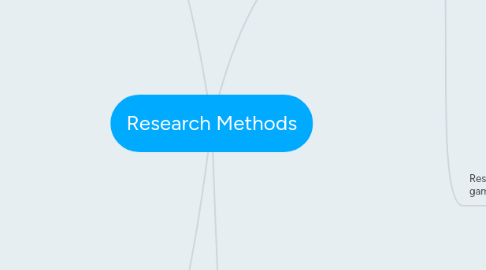
1. Focus groups
1.1. Advantages
1.1.1. 1. "Information is provided more quickly than if people were interviewed separately".
1.1.2. 2. "The researcher can get information from non-verbal responses, such as facial expressions or body language".
1.1.3. 3. "it is relatively inexpensive".
1.1.4. 4. "moderator can keep the discussion under control and focus on the areas of interest".
1.1.5. 5. "A focus group is not static. The moderator can bring any changes in order to better facilitate the discussion during the group discussion".
1.2. Disadvantages
1.2.1. 1. "Inexperienced moderator may face problems in controlling some participants who try to dominate the group".
1.2.2. 2. "Respondents may be reluctant to share some sensitive ideas and concerns publicly".
1.2.3. 3. "these large volumes of qualitative data might be difficult to analyze".
1.2.4. 4. "Small numbers and convenience sampling severely limit ability to generalize to larger populations".
1.2.5. 5. "The moderator's skill in phrasing questions along with the setting can affect responses and skew results".
2. Questionnaires
2.1. Advantages
2.1.1. 1."Potentially information can be collected from a large portion of a group. This potential is not often realised, as returns from questionnaires are usually low. However return rates can be dramatically improved if the questionnaire is delivered and responded to in class time. "
2.1.2. 2. "The responses are gathered in a standardised way, so questionnaires are more objective, certainly more so than interviews."
2.1.3. 3. "Surveys can be inexpensive especially if they are self administrated."
2.1.4. 4. "They can be used sent to different locations by using mail, email or telephone."
2.1.5. 5. "If anonymous, perhaps more honest answers will be provided."
2.2. Disadvantages
2.2.1. 1."Open-ended questions can generate large amounts of data that can take a long time to process and analyse."
2.2.2. 2. "Respondents may answer superficially especially if the questionnaire takes a long time to complete."
2.2.3. 3. "If it is an anonymous survey people may not give a valid answer."
2.2.4. 4. "The researcher must ensure that a large number of the selected sample will reply."
2.2.5. 5. "They are impersonal, people may be more open face to face discussions"
3. Semi-structured interviews
3.1. Advantages
3.1.1. 1. "Many researchers like to use semi-structured interviews because questions can be prepared ahead of time. This allows the interviewer to be prepared and appear competent during the interview."
3.1.2. 2. "Semi-structured interviews also allow informants the freedom to express their views in their own terms."
3.1.3. 3. "Large amount of details can be generated."
3.1.4. 4. "Fairly reliable and easy to analyse."
3.1.5. 5. "When individuals are interviewed they may more easily discuss sensitive issues"
3.2. Disadvantages
3.2.1. 1. "Interviewing skills are required."
3.2.2. 2. "Preparation must be carefully planned so as not to make the questions prescriptive or leading."
3.2.3. 3. "Can't guarantee honesty of participants."
3.2.4. 4. "Open-ended questions are difficult to analyse."
3.2.5. 5. "Time consuming and resource intensive"
4. Research
4.1. Ethics and their meanings
4.1.1. 1. Risk of harm
4.1.1.1. "Assessments enable researchers, reviewers, and funders to decide whether the research is worth doing at all, and whether it could be made less risky."
4.1.2. 2. Informed consent
4.1.2.1. "The knowing consent of an individual without undue inducement or any element of force, fraud, duress or any other form of constraint or coercion. Sufficient information must be presented (in understandable language) so that the potential subject can make an informed judgment about participation."
4.1.3. 3. Anonymity
4.1.3.1. "In research, participants are assured anonymity; that is, their personal details are never passed on to third parties, not even to the commissioning client."
4.1.4. 4. Institutional Review Board (IRB)
4.1.4.1. "is a committee established to review and approve research involving human subjects. The purpose of the IRB is to ensure that all human subject research be conducted in accordance with all federal, institutional, and ethical guidelines."
4.2. Research topic(Video games)
4.2.1. Research Question
4.2.1.1. Does the systematic playing in video games cause the aggression in players?
4.2.1.1.1. Why?
4.2.1.1.2. Where?
4.2.1.1.3. When?
4.2.1.2. How can video games affect the children's behavior?
4.2.1.2.1. How?
4.2.1.2.2. When?
4.2.1.3. Why is addiction to video games might be a bad habit for teenagers ?
4.2.1.3.1. Why?
4.2.1.3.2. When?
4.2.1.4. How can video games change a society way of action?
4.2.1.4.1. How?
4.2.1.4.2. When?
4.2.1.5. How can gaming events make gaming community more attractive and lovable ?
4.2.1.5.1. How?
4.2.1.5.2. When?
